Dear friends I haven't met yet,
I've talked about bullet journalling a lot in my posts. I think now is the time to explain my organizational system. Here's a brief overview of what I use, analog and digital:
-
Writing bullet journal, for specifically writing fiction
-
Language notebooks, for notes and practice in my second languages
-
Habitica app, for my Miracle Morning checklist, habits, and next projects
-
Tody app, for chores
-
Scratch pad, for brain dumps, capturing thoughts, and one time use items like formulas
-
Memo app, for the same as above and grocery lists
-
Diary, for long-form journal entries every day
First, here's how I have my bullet journal set up. Every month, I start by laying out a month's worth of pages. The least frequently touched two pages come first: A) A calendar I check when I make each week, updating based on the 2 year calendar I keep only for dates. B) A quadrant page, where I note my goals and tasks for the month, any life changes, and in the end, a short review of my life that month.
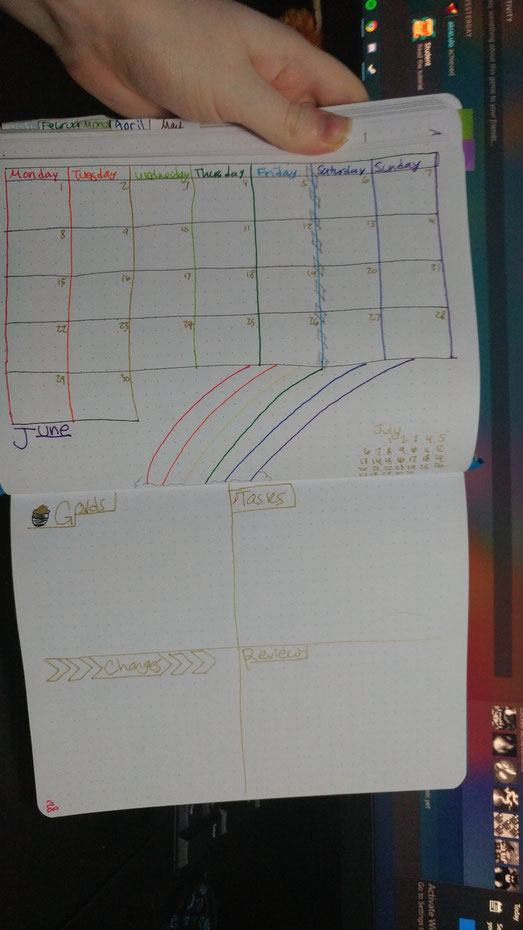
The first thing I fill out every day is my sleep chart. The page has each day on the left and the hours of the day across the page. On a scale of 1-5, how did I sleep? On a timeline encompassing 24 hours, when did I sleep? This helps me see the first thing that could influence how my days went—especially seeing when I got no sleep at all!
Then comes the big thing I tell everyone about: the lifechart. This brings a bunch of qualitative data together in a readable format in two forms: Scales and yes/no answers. Across the horizontal page is one column for each day. The top few rows are the scales. I copy over my "how did I sleep" question, along with how much energy and creative juices I had, how positive my emotions were, and how enthusiastically I approached the day. The total of those is what I call my SEEJE score, and provides one metric for how well my day went. Below that is my appetite, which can be good or bad at either end of the scale, so it isn't part of my SEEJE score.
Then it's mostly yes/no questions. Did I mention shit happening in my notes that affected my day, such as when my grandma recently died? Did I have sex? Did I experience a problem with any number of common migraine or GI symptoms? Did I consume lactose with or without medicine, as I'm lactose intolerant? Alcohol? Did I have problems with my mental symptoms? Not only could any of these influence my day overall, they could affect each other. For instance, having lactose without medicine can give me GI symptoms, which in turn can affect my sleep.
On this page I would also use a symbol to track periods—presence or absence, flow, spotting, and cramps. The only other thing not yes/no or a numeric scale is where I'm at--or rather, where I think I'm at--which my bipolar episodes, whether that's more elevated or more depressed.
If you make your own lifechart, it should adapt to your needs. Not everyone has periods or bipolar or IBS--make your chart useful to you. When asking yourself what to include, think of the following: What impacts my ability to cross things off my to-do list? What enables me to live a better, more productive life? What causes or impacts those things? What MIGHT impact those things, that I want to see about increasing or decreasing as appropriate? What do you have control over that could make your day better?
Answers to that last question might bring you more into the next territory: Habits. It's hard to say where the line should be drawn on what's a habit to be kept track of and what's best left in the lifechart. For me, the line is this: If I want to steadily change the frequency of an action I know has an affect on my life, that I also have control over, it's a habit, good or bad. Things I want to do more frequently include exercise, meditation, creative ventures, reading, remembering my vital morning medicine, and doing my morning/night routines. The one thing I want to do less is pick at my body, but it used to be biting my nails until I successfully broke that habit.
For me it's also important habits are not all or nothing. Each habit has a partial success level, usually indicating I did something about halfway. It's important to be clear about what counts as full or partial success. For exercise, stretching is partial, but walking around the mall for hours nets me nothing, and so could count as a failure. For me I use a checkmark for success, an X for failure, and a line for a partial success.
The next page I update a few times a month or when it's relevant: My monthly observations page. This keeps track of how I'm doing. (What number of days did SEEGE come up good? Bad? How often was I sick this time?) Mainly, however, this is to look at correlations--like lactose keeping me up at night by way of giving me GI symptoms. If I change my habits, I also note that here. When my grandma died, I changed my Miracle Morning to be less demanding, as I was going through grief for someone who helped raise me for 15 years.
This page gets the bulk of its use after the month is over, and I have several full pages of data to examine. Here's some examples of my observations:
-
It takes a lot of lactose to give me actual symptoms, especially with meds
-
Bad days can immediately follow good days. Is this often?
-
I'm less tired when I have an agenda to following
-
More good days this month than last month
The next page is my weekly. I update this at least once before the week begins, and look at it every day. At the top are a few lines to note any upcoming events at a specific time, such as doctor's appointments or social dates. After that, the rest of the page is purely my task list for the week. This is where all my preplanned tasks go, such as updating my next weekly, asking someone a question, or brainstorming this very blog post.
The next part of my system I change the most, and hasn't settled into one form yet. Everyday, I note down what I actually did, planned or not, big or small, and notes about what happened. For instance, I note what oracle card I pulled, what exercise I did, how I felt after exercising, and anything that threw off my plans. For the month of June, this is just going to look like a list down the page with different types of bullet indicating the different types of thoughts, much like the original system.
The rest of the pages I touch only when relevant. They are collections, mostly to do with goals or historical records. I record the names and brief details of media I consume so I can find it later. I made a page for my big goals for the entire year, and a page or more for each goal to be broken down into manageable parts, writing down what I'll reward myself with too. Some of my recent goals pages look like this:
While not necessarily part of the system formally, I try to keep a log with Goodreads instead of in my bullet journal, as I can refer to it even after my bullet journal is through. I do the same with anime, but much less diligently. The purpose is to be able to refer to something I might want to read/watch again, or something I want to refer to a friend.
The rest of my organizational method is filling in gaps like that or meeting a special need, as it isn't practical to clutter up my bullet journal with everything.
First, since it's such a big part of my life, I have a whole other journal for writing. This wouldn't necessarily be, except that the process of writing and publishing a novel is likely to outlast my main bullet journal, and I don't want to need to copy over so much to a new journal every three months to a year. I have many writing specific collections here, such as a road map to writing the first act of my novel. I also have long-form notes specifically for my fiction, such as notes on characters, scenes, or settings. Each time I undertake a writing challenge such as NaNoWriMo, it goes here as well. Mostly, this all just takes up a lot of space and will be referenced a lot, so it gets its own journal.
I do something called brain dumps a lot. Things like brainstorms, random lists, phone numbers, addresses, and mathematics. It'd be a waste of space to keep them in my bullet journal when I'll probably only use them once, so I just make things like grocery lists on my phone, so its wherever I go. I put other brain dumps either there or on a scratch pad which I'll recycle later. If what I make ends up actually needing to be referenced—like a brainstorm on goals for the future--I'll copy it elsewhere in much neater handwriting. In all, I go through one scratch pad every six months to a year, and keep very few pages from it.
One case of a brain dump being copied brings me to my digital tools. When I was first doing my Miracle Morning, I designed something I needed to reference everyday, but needed to be adaptable in both order and content. I ended up settling on the app Habitica. I could change the order and content on a whim, and every day it would automatically reset my progress. (Importantly, undone daily habits don't stack up into a backlog—I find that ridiculous. If I need to exercise every day, I can't well just make up for it by exercising twice some other day.)
I also use this app to keep track of the next step in all my ongoing projects, steps that might take more than a day to complete or span more than a week. Right now they're all in Japanese—read that one story, read the next chapter of a Japanese-language manga, etc.
Speaking of language, I have a few language-specific notebooks too. For Japanese, it's a grid book ("quad-lined.") In them, I put notes on grammar, vocab, what I'm reading and doing, all in as much of my target language as possible.
Because of my illnesses, I may plan to do a chore only to have to delay it by a day, a week, a month. That's why I like the app Tody. In short, I enter which rooms in my house I have, and which chores need to be done there regularly, and how often I want/need to do them. If I end up doing a chore on a different day than I originally wanted, the app automatically adjusts. It also gives me an idea of just how overdue an item is, so I can prioritise. (For instance, the floor in the kitchen hasn't been swept in a month having higher priority over sweeping in the living room, which was done a few days ago.)
Last and most importantly, every day after I use my bullet journal, I also make an entry in my long-form diary journal. Entries tend to be one to three paragraphs and span only a page or two, since they're only capturing one day at a time. It's a really important part of combating my memory problems and poor mental health.
A Typical Day
Before I go to bed, I start an automatic timer to track when I sleep. In the middle of the night, I have a dream that makes me think of a question to ask my boyfriend. I write down the question on my phone. In the morning I stop the timer, check Habitica and do my morning tasks in order, crossing them off as I go. When I get to bullet journalling, I write down to ask my boyfriend the question from my phone. I write down data from the previous day in my lifechart. I tick off how well I did with each my habits. I make a note that I haven't been able to exercise due to being ill in my monthly observations. I write in my diary for maybe 10 minutes. I realise I'm grateful for candy canes I can melt into my coffee, so I turn to my gratitude collection and write that down.
I want to calculate how long I have to row on the row machine to do the equivalent of going a mile. I use my phone's calculator and my scratchpad to figure out the algebra and isolate x. I figure out it takes 170 minutes to go a single mile. It's discouraging but I write my pace down and make goals in my tracker to go 1 mile, 5 miles, and 10 miles via row machine. They go on the same page as my goals for how far to jog and bike. I also have an "overall distance traveled" goal on that page, based on how many miles it is to the moon. I go exercise for 17 minutes and update my tracker to be 1/10th of the way to a mile.
My boyfriend and I make a shopping list on my phone, then go to the store. When we get home, I delete everything we got and only keep what still needs to be bought soon on the list. I make a note in my bullet journal that the garden section of the store gave me a headache, but it subsided as soon as we left.
I take some time for myself, then use my writing bullet journal to brainstorm a short story. I log how much time I spent working on that and what I accomplished in my writing log.
After dinner, I refer to the Habitica app to see which project I might work on. I settle on reading the next chapter of a Japanese manga. I get out my Japanese notebook and take notes, keeping a summary of what's happening in my own (Japanese) words. When I'm done, I write down any new vocab words and what they mean—also in Japanese, if possible. I also keep a diary in Japanese and make a short entry in that. If I managed to finish the chapter, I mark off the task in Habitica and make a new one for the next chapter. I decide I want to read more of a manga I own in English, but continue making a summary of it in my Japanese notebook, in the Japanese language. I finish that manga volume and make a note of that on my Goodreads account.
I write in my bullet journal what I just did under that day's date. I note that I have trouble with particular grammatical constructions. Under my weekly tasks, I put "review weak JP grammar points." While writing that, I see to ask my boyfriend about the dream I had, and since he's around, I do that and cross it off.
Currently Reading
The Bullet Journal Method by Ryder Carroll
Princess Jellyfish by Akiko Hagashimura
An Absolutely Remarkable Thing by Hank Green
Aesops Fables

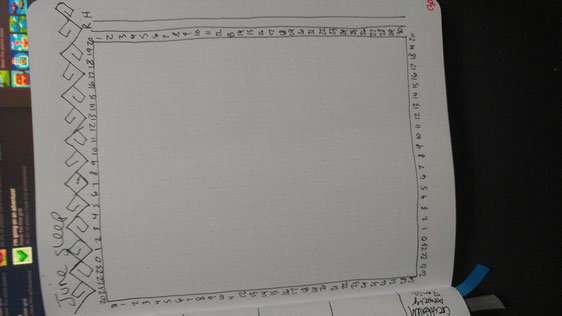
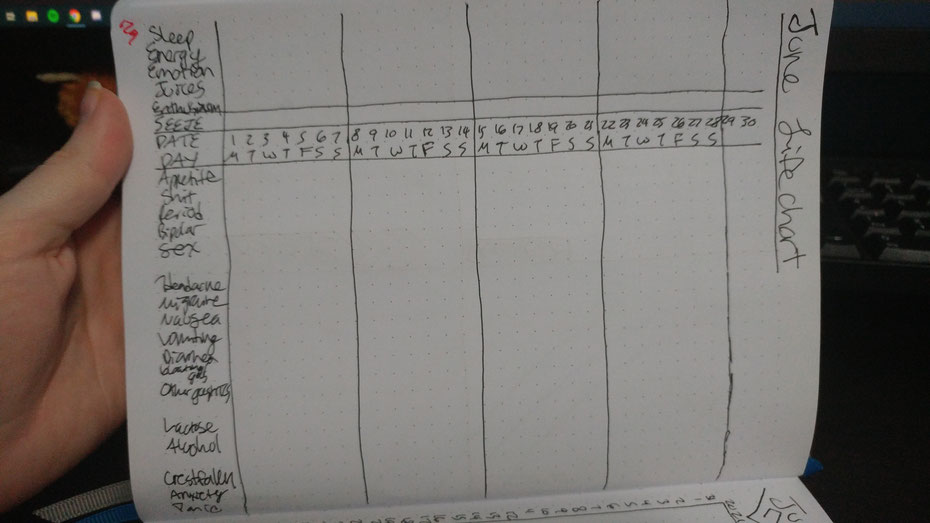
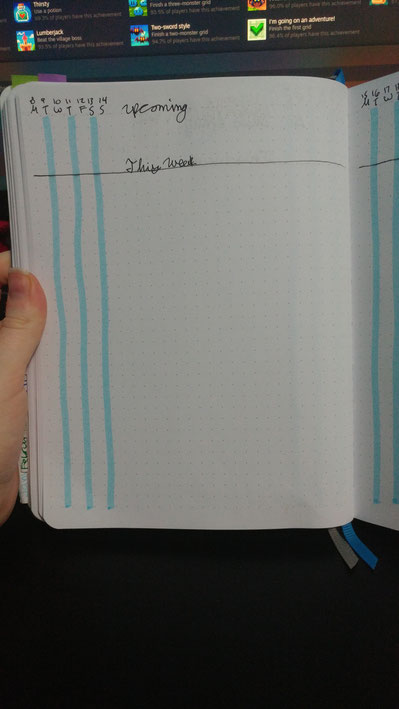


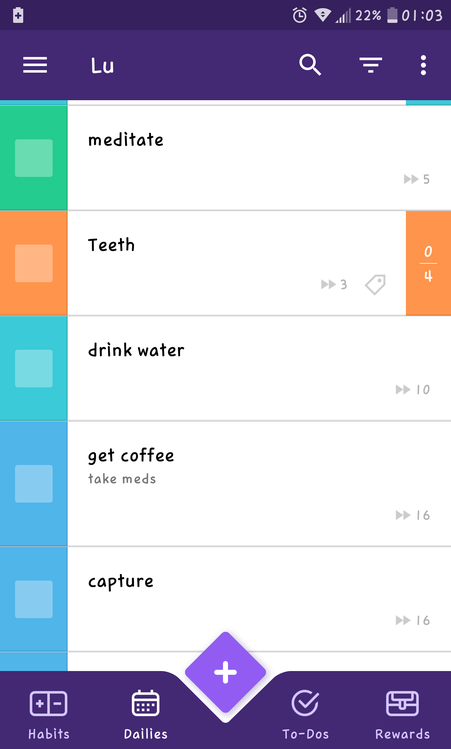
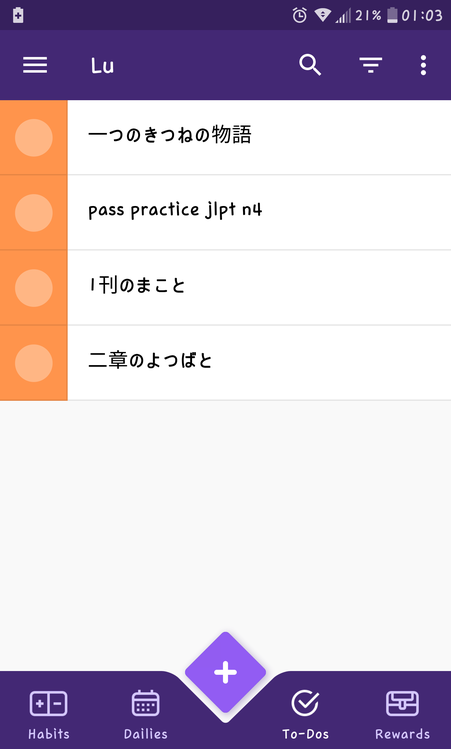

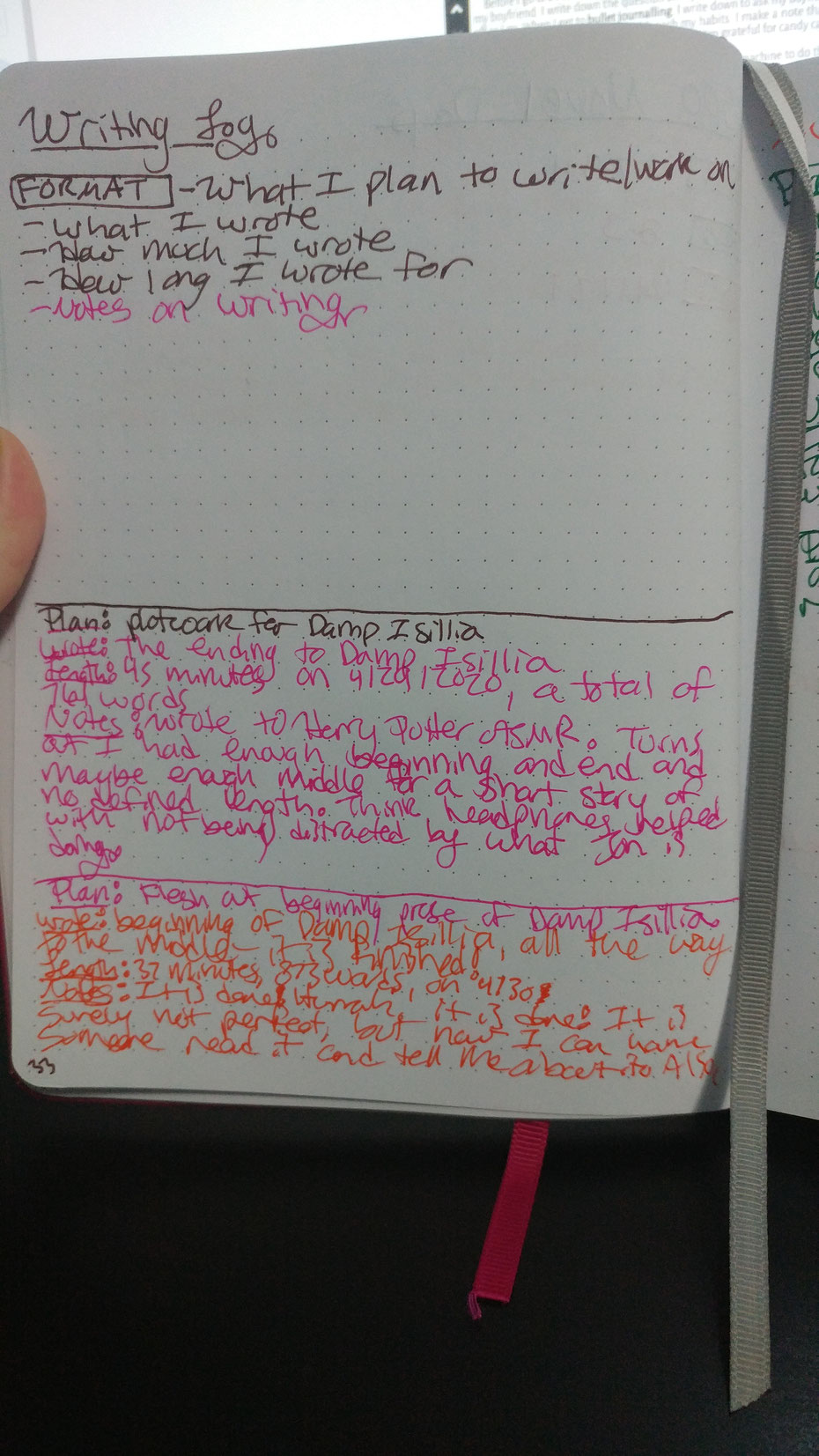
Write a comment